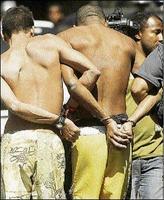Mark Beckford, Staff Reporter

Policemen detain two suspects during an anti-drug raid in the Pavao-Pavaozinho slum in Rio de Janeiro on April 28. - AP
A multidimensional strategy including a strong emphasis on improved police-community relations has been credited for Brazil's success in curbing crime in its second largest city.
The anti-crime push - which is also hinged on rehabilitating troubled youths and seizing guns from the streets - has been critical to Cesar Rubem battling lawlessness in his native Rio de Janeiro.
"Our work has tried to look at these three components - working with young people, gun reduction and gun control, and you must have police action if you want to control guns," he told The Gleaner Tuesday.
GUN CRIMES
Rubem, founder and executive secretary of the non-governmental group Viva Rio, has seen some of the worst forms of gun crimes and juvenile deviancy. However, he has been able to effect change in Brazil and Jamaica's neighbour Haiti, a Caribbean nation wracked by endemic poverty, widespread illiteracy and political upheaval.
Rio and Jamaica's cities share similar experiences on the subject of crime and violence. In 2006, Jamaica, with a population of 2.6 million, tolled 1,340 murders. Rio, with more than six million persons, in the same year tallied 2,273 deaths.
Violent crime in both countries is fuelled by a jigsaw puzzle of urban shantytowns teeming with unemployed youth, some of whom are wooed by gangs. In Jamaica, they are called ghettos; Brazil dubs them favelas. The use of small firearms figures prominently as the weapon of choice in both countries.
Rubem, who is in Jamaica as a guest of the United Nations Development Programme and the Violence Prevention Alliance, shared some of the strategies his organisation has pursued in taming the crime monster in Brazil's former capital.
"We have a lot of gun violence in Brazil, very, very tough, especially in Rio de Janeiro. The main issue is that you have a combination of community control and drug dealing. The control comeswith guns and the money comes from the drug dealing."
Rubem told The Gleaner that since his organisation's inception in 1993, it has been able to help more than 100,000 marginalised youths through its programmes. He also said the state had adopted the idea of helping dropouts and juvenile delinquents reintegrate into society.
Out of school
"Young people who have dropped out of school, if you are in school you can still make a career, a strategy of life. When you drop out of school, you are out, and unless you have studied, it is hard to go to the labour market," the activist pleaded.
Rubem is also a firm believer in negotiating with gangsters and providing incentives in order to reduce crime. This approach, he said, was used in Haiti to great effect.
His organisation approached gang leaders and offered them 30 scholarships a month for children in the five warring sections through a lottery system.
Viva Rio also offered an extra training incentive for gang leaders if they held to an agreement to ensure that no violence was committed over a two-month period. They have held to that commitment since May 2007.
"We managed to facilitate a peace accord among gang leaders in Bel-Air in the centre of Port-au- Prince (Haiti's capital) and that was very surprising for us since that has been achieved, it is possible to negotiate peace."
In terms of gun control, Rubem has pointed to the Disarmament Statute and the gun amnesty in his country between July 2004 and October 2005 which yielded more than 500,000 guns.
Gun ownership
The Disarmament Statute has several limitations with gun ownership. These include the right to own a gun but not carry it in public, and strict conditions on gun licence issuance. Also, all ammunition must be traceable.
A person who is under 25 years old cannot own a gun, and civilians are prohibited from purchasing semi-automatic and automatic guns for personal use. Rubem also said that gun convictions carried a minimum sentence of four years.
mark.beckford@gleanerjm.com

Cesar Rubem, executive secretary of Viva Rio, says targeting high-school dropouts is critical to addressing crime. - Ian Allen/Staff Photographer

